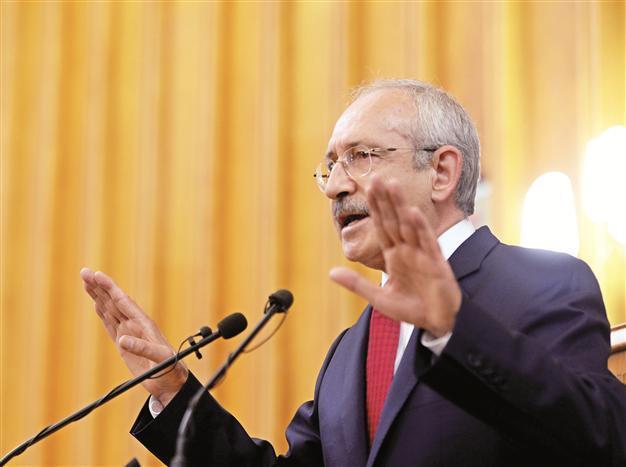Main opposition leader makes midnight call to president over Gezi Park protests
ANKARA

File photo shows main opposition party leader Kemal Kılıçdaroğlu. DAILY NEWS photo / Selahattin SÖNMEZ
The main opposition party is planning to turn the Gezi Park protests and
the government’s anti-democratic stance regarding peaceful
demonstrators into an international issue with vows to take police
brutality to the European human rights court.
The Republican
People’s Party (CHP) is examining the legality of such a move, its
spokesperson Haluk Koç told reporters during the social democrat party’s
Central Decision-Making Council meeting June 12. It was the second
MYK meeting June 12 following the first one, which took place in an
extraordinary session at 1:30 a.m.
CHP leader Kemal Kılıçdaroğlu
called President Abdullah Gül to initiate for a meeting with leaders of
the political parties in a bid to defuse the tension, a move later
rejected by the president. “It is up to the president. We have made a
proposal within the legitimate framework,” Koç said without elaborating
further.
Koç dismissed the possibility of a meeting between
Prime Minister Recep Tayyip Erdoğan and Kılıçdaroğlu on the grounds that
the prime minister had lost his legitimacy.
One of the
decisions taken at the meeting was to follow the incidents at Gezi Park
and Taksim Square first hand by rotating lawmakers to stand with
protestors. Deputy leaders of the party will continue to keep in touch
with local governors and police department officials in Istanbul to ease
the conditions of the protestors.
Euro court way As
part of plans to make the international community better informed on
the ongoing process, Kılıçdaroğlu is expected to hold a press conference
with representatives of foreign media in Turkey over the weekend. In
addition, the CHP is planning to hold a comprehensive meeting with
ambassadors of foreign countries on June 10.
Süheyl Batum,
Eskişehir deputy of the main opposition Republican People’s Party (CHP)
pledged to take the allegations of police brutality committed during the
Gezi protests to the European Court of Human Rights (ECHR), if a remedy
is not found through domestic means.
Batum said the behavior of
the police at the Gezi protests was inhumane treatment going beyond
disproportionate use of force and if their criminal complaint on that
fails to obtain results, they will refer the issue to the ECHR, in a
press conference held with the participation of some CHP deputies on
June 12.
“If the prime minister, some chiefs of police and
mayors try to overlook this inhumane treatment, try even to make them
seem legitimate, we will definitely bring them to account. We will press
charges. If they do not do anything with the criminal complaints, we
will press charges against the interior minister. If the interior
minister does not do anything, we will carry [it] directly to the ECHR.
Compiling all the videos, photographs, examples of criminal complaints
for the ECHR, we will send them against the interior minister of the
Turkish Republic.”
Undercover police Batum also
criticized the presence of undercover police among protesters.
“Individuals that intervene without any badge, symbol, sign, vest to
show that they are policemen, are definitely illegal. At most, these
are, in their terms, those who think the protests are done against the
party and gave themselves the duty, the white dogs. I am saying this
very clearly,” Batum said, once more pointing at “white dogs,” making a
reference to the abbreviation of the Justice and Development Party’s
(AKP) name, since “ak” means white.
Batum said Prime Minister
Recep Tayyip Erdoğan is to blame for police brutality and argued that
any prime minister would have resigned in a democratic country,
alongside the interior minister, chief of police and mayor.
CHP
Istanbul Deputy Mahmut Tanal said May 9 in Ankara that he had filed a
criminal report against Prime Minister Recep Tayyip Erdoğan because he
“aroused the people to hatred and hostility, slandered and insulted
them.”
